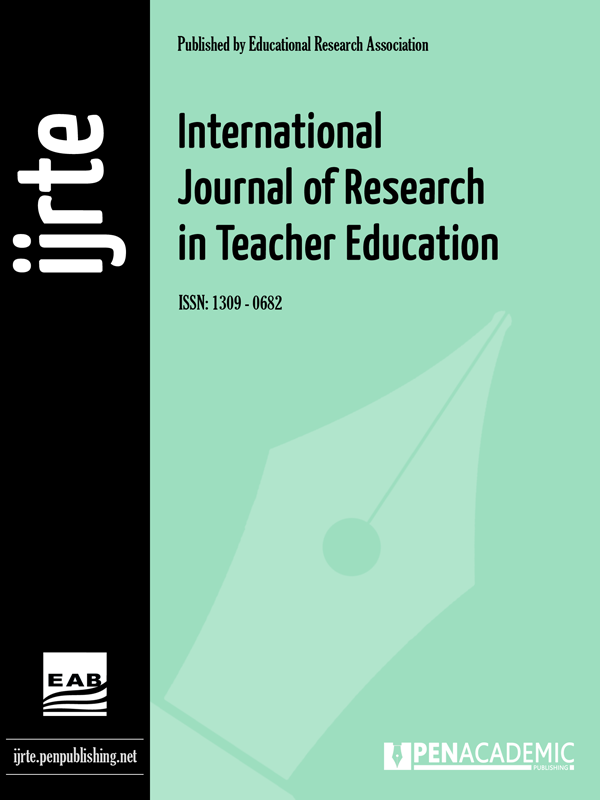Original article | International Journal of Research in Teacher Education 2021, Vol. 12(3) 10-31
Teaching Special Education During the COVID-19 Pandemic: An Exploratory Mixed Methods Analysis
Samuel Rodriguez, Harry Voulgarakis , Patricia Barry, Jessica Scher Lisa, Kerry Ann Conde, Yvonne Sinisgalli
pp. 10 - 31 | Manu. Number: ijrte.2021.014
Published online: September 30, 2021 | Number of Views: 142 | Number of Download: 470
Abstract
The arrival of the global pandemic transformed the system of teaching and learning instantaneously for school staffs, students and their families. It has become more apparent that the change in venue has brought about conditions that directly impact the quality of the teaching and the degree to which students learn. Special educators in particular, given the heterogenous nature of those that they teach and their unique learning needs, are faced with challenges that are arguably beyond most other educators. The current study utilized a mixed-methods approach in an effort to investigate and delve into the perspectives special education teachers hold related to: (a) The support and training they received; (b) Feelings of self-efficacy; and (c) general impressions about the students and families they interact with. General results and analysis were indicative of several findings. Specifically, that special education teacher participant felt supported by their faculty and administrative staffs, the teachers did a significant amount of independent learning, that their respective pre-service, formal training was lacking in preparing for virtual learning, and all participants reported significant additional stress challenges, including working with technology. Limitations and future research possibilities are discussed.
Keywords:
| How to Cite this Article? |
|---|
|
APA 6th edition Harvard Chicago 16th edition |
| References |
|---|
|
American Psychological Association. (2020). Publication manual of the American Psychological Association (7th ed.). Author. Ahmed, E. (2020). Classroom discipline management: A mixed method study. Journal of Classroom Interaction, 55(1), 64-76. Archambault, L., & Kennedy, K. (2014) Teacher preparation for K-12 online and blended learning. In R. E. Ferdig & K. Kennedy (Eds.), Handbook of research on K-12 online learning (pp. 225–244). Pittsburgh, PA: ETC. Birch, R. and Lewis, K. (2020). Building partnerships to support teachers with distance learning during the Covid-19 Pandemic Cohorts, confidence, and microteaching, Issues in Teacher Education, 29(1/2), 149-157. Black, E. (2009). An evaluation of familial involvements’ influence on student achievement in K-12 virtual schooling. In P. Burdette & D. Greer (Eds.) 2014. Online learning and students with disabilities: Parent perspectives. Journal of Interactive Online Learning, 13(2), 67-88. Bryman, A. (2006). Integrating quantitative and qualitative research: How is it done? Qualitative Research, 6(1), 97-113. Burdette, P. & Greer, D. (2014). Online learning and students with disabilities: Parent perspectives. Journal of Interactive Online Learning, 13(2), 67-88. Creswell, J. & Plano-Clark, V. (2018). Designing and conducting mixed methods research (4th ed.). Los Angeles: Sage. Daffern, T. & Critten, S. (2019). Student and teacher perspectives on spelling. Australian Journal of Language and Literacy, 42(1), 39-54. DiPietro, M., Ferdig, R., Black, E. & Preston, M. (2008). Best practices in teaching K-12 online: Lessons learned from Michigan virtual school teachers. Journal of Interactive Online Learning, 7(1), 10-35. Fernandez, R., Ferdig, R., Thompson, L., Schottke, K. & Black, E. (2016). Students with special health care needs in K-12 virtual schools. Educational Technology & Society, 19(1), 67-75. Fredericksen, E., Pickett, A. & Shea, P. (2000). Factors influencing faculty satisfaction with asynchronous teaching and learning in the SUNY learning network. Journal of Asynchronous Learning Networks, 4(3), 245-278. Irvine, V., Mappin, D., & Code, J. (2003). Preparing teachers to teach online: The role of faculties of education. In D. Lassner & C. McNaught (Eds.), Proceedings of EdMedia: World conference on educational media and technology 2003 (pp. 1978–1981). Association for the Advancement of Computing in Education. Machado, C. & Wang, P. (2019). Instructional strategies and motivational factors: A mixed-methods study of pre-service teachers’ perspectives. Asia Pacific Educational Review, 20(3), 407-422. Marteney, T. & Bernadowski, C. (2016). Teachers’ perceptions of the benefits of online instruction for students with special needs. British Journal of Special Education, 43(2), 178-194. Nelson & Murakami (2020). Principals and teachers poured their energies into developing learning comparable with on-campus opportunities. ISEA, 48(3), 109-115. Newman, I. & Benz, C. (1998). Qualitative-Quantitative research methodology: An interactive continuum. Carbondale, IL: Southern Illinois University. Newman, I. & Houchins, D. (2018). Conceptualizing mixed methods questions in special education research. Research in the Schools, 25(2), 23-33. Oliver, K., Kellogg, S., Townsend, L. & Brady, K. (2010). Needs of elementary and middle school teachers developing online courses for a virtual school. Distance Education, 31(1), 55-75. Phillips, C. (2020). San Antonio ISD has lost contact with 25%of its elementary students since Spring Break. Texas Public radio (retrieved from https://www.tpr.org/post/san-antonio-isd-has-lost-contact-25-its-elementary-stduents-spring-break). Sheninger, E. (2014). Digital leadership: Changing paradigms for changing times. New York: Corwin.
Smith, S., Basham, J., Rice, M. & Carter Jr., A. (2016). Preparing special educators for the K-12 online learning environment: A survey of teacher educators. Journal of Special Education Technology, 31(3), 170-178. Stevenson, M., Hedberg, J., O’Sullivan, K. & Howe, C. (2015). Developing to learning: Semantic shifts on professional autonomy and school leadership. Educational Media International, 52(3), 173-187. Thompson, L., Ferdig, R. & Black, E. (2012). Online schools and children with special health and educational needs: Comparison with performance in traditional schools. Journal of Medical Internet Research, 14(3), 1-9. Wolf, P. (2006). Best practices in the training of faculty to teach online. Journal of Computing in Higher Education, 17(2), 47-78.
|


